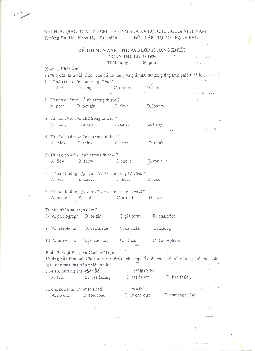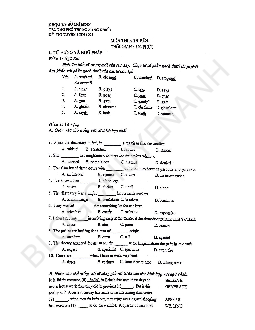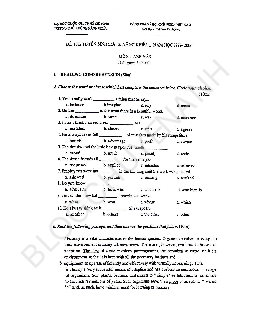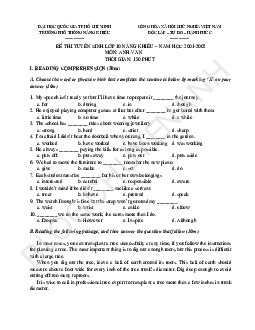






Preview text:
ĐỀ LUYỆN TẬP SỐ 3
I. Mark the letter A, B, C or D that best completes each sentence from 1 to 25.
1. After her divorce, Sandra has been so depressed that she always stays indoors and steers
............................... of meeting people. A. left B. clear C. right D. fear
2. He is .............................................. of his generation.
A. the easily more successful pop singer
B. quite the more successful pop singer C. much more
successful D. by far the most successful pop singer
3. It is vital that ..................................................... out of the reach of children.
A. you will keep these pesticides
B. to be kept these pesticides
C. you must keep these pesticides D. these pesticides be kept
4. I couldn‟t decide what to write about, when I suddenly ....................................................... upon some ideas. A. thought B. came C. ran D. hit
5. A person who has drunk too much alcohol would .............................................................. A. stagger B. swagger C. tramp D. prowl
6. It is dificult to decide on the best .............................................. of action in these circumstances. A. measure B. course C. process D. policy
7. I‟ve been looking for my classes all morning. I don‟t have a ................................................. where I left them. A. clue B. hint C. sign D. theory
8. You shouldn‟t trust James. .............................................. he may seem, he thinks only of himself. A. Whatever sympathy
B. In contrast to his sympathy C. However sympathetic D. As sympathetic
9. All the invitations have been sent. .................................. the seating plan, that can wait till next week. A. But for B. As well as C. Due to D. As for
10. We really should have looked at the timetable when we got off the ferry. We ................................................
the six-thirty train, but now we have to hang around here until twenty past eight. A. had to catch
B. must have caught C. could have caught D. might catch
11. Tom and Ben have fallen ............................................ again and do not speak to each other. A. in B. back C. through D. out
12. She found it hard to ............................................. up to the fact that she would lose him for ever. A. get B. come C. face D. keep
13. He won his first two matches but from then on things ..................................... He hasn‟t won a match since. Page 1 of 7 A. went down the hills B. went downmountain C. went downhill D. went down the mountain
14. The school was closed for a month because of a serious ...................................... of fever.
A. outcome B. outburst C. outbreak D. outset
15. I can‟t .................................. what he‟s doing. It‟s so dark down here. A. see through
B. make out C. look into D. show up
16. James never shows his emotions; no matter what happens, he always keeps a stiff upper .............................. A. mouth B. eye C. head D. lip
17. The curator felt it was ................................................... that it should be at the center of the display.
A. a such significant exhibit B. so significant an exhibit
C. so much a significant exhibit D. exhibit so significant
18. Students who haven‟t taken the introductory course in Physics will be out of their ................................ A. class B. league C. depth D. head
19. I wouldn‟t try that if I were you, unless you like playing with ...............................
A. fire B. ice C. air D. trouble
20. I was ............................................ the impression that coach tickets were more expensive than train tickets. A. on B. in C. under D. towards
21. He .......................................... the book from her hand. A. seized
B. regained C. recovered D. obtained
22. ................................................, watching our every move.
A. Stood a tall man at the back of the room B. A tall man at the back of the room stood C. Stood at the back of the room a tall man
D. At the back of the room stood a tall man
23. The girl fainted but she came .................................... when we grew some water on her face. A. up B. round C. on D. through
24. Harry‟s refusal to answer the policeman‟s questions ................................. the suspicion of most colleagues. A. rose B. raised C. arose D. aroused
25. Don't worry, I won't tell anyone your secret. You can ............................................... on me. A. stand B. plan C. count D. fall
II. Mark the letter A, B, C or D to indicate the word that differs from the rest in the position of the main
stress in each of the following questions from 26 to 30.
26. A. considerate B. continental C. territorial D. economic
27. A. index B. commit C. preview D. open 28. A. specify B. illustrate C. interact D. fertilize 29. A. habitat B. attendance C. candidate D. wilderness 30. A. miniature B. escalation C. manufacture D. influential Page 2 of 7
III. Read the following passage and mark the letter A, B, C or D to choose the word or phrase that best
fits each of the numbered blanks from 31 to 40.
What is meant by the term economic resources? In general, these are all the natural, man-made, and human
resources that go into the (31) ................................... of goods and services. Economic resources can be broken
down into (32) ....................................... general categories: property resource – land and capital, and human
resources – labor and entrepreneurial skills.
What do economists mean (33) ..................................... land? Much more than the non-economist, land refers to
all the natural resources (34) ..................................... are usable in the production process: arable land, forests,
mineral and oil deposits, and (35) ................................... on. What about capital? Capital goods are all the man-
made aids to producing, storing, transporting, and distributing goods and (36) ..........................................
Capital goods differ from consumer goods in that (37) ............................................ satisfy wants directly, while
the former do so indirectly by facilitating the production of consumer goods. It should be noted that capital as
defined here does not (38) ..................................................... to money. Money, as such, produces nothing.
The term labor refers to the physical and mental talents of humans used to produce goods and services (with the
exception of a certain set of human talents, entrepreneurial skills, which will be considered separately because
of their special significance). Thus the services of a factory worker or an office worker, a ballet
(39) ........................................ or an astronaut all fall (40) ....................................... the general heading of labor. 31. A. production B. plant C. using D. doing 32. A. many B. six C. two D. some 33. A. by B. using C. calling D. with 34. A. these B. they C. what D. that 35. A. so B. come C. such D. go 36. A. money B. machines C. crops D. services
37. A. later B. lately C. the latter D. the latest 38. A. come B. go C. speak D. refer
39. A. performance B. director C. writer D. dancer 40. A. into B. from C. under D. to
IV. Read the following passage and mark the letter A, B, C or D to indicate the answer to each of the
questions from 41 to 50.
Esperanto is what is called a planned, or artificial, language. It was created more than a century ago by Polish
eye doctor Ludwik Lazar Zamenhof. Zamenhof believed that a common language would help to alleviate some
of the misunderstandings among cultures.
In Zamenhof‟s first attempt at a universal language, he tried to create a language that was as uncomplicated as
possible. This first language included words such as ab, ac, ba, eb, be, and ce. This did not result in a workable
language in that these monosyllabic words, though short, were not easy to understand or to retain. Page 3 of 7
Next, Zamenhof tried a different way of constructing a simplified language. He made the words in his language
sound like words that people already knew, but he simplified the grammar tremendously. One example of how
he simplified the language can be seen in the suffixes: all nouns in this language end in o, as in the noun amiko,
which means “friend”, and all adjectives end in -a, as in the adjective bela, which means “pretty”. Another
example of the simplified language can be seen in the prefix mal-, which makes a word opposite in meaning;
the word malamiko therefore means “enemy”, and the word malbela therefore means “ugly” in Zamenhof‟s language.
In 1887, Zamenhof wrote a description of this language and published it. He used a pen name, Dr. Esperanto,
when signing the book. He selected the name Esperanto because this word means “a person who hopes” in his
language. Esperanto clubs began popping up throughout Europe, and by 1950, Esperanto had spread from Europe toAmerica andAsia.
In 1905, the First World Congress of Esperanto took place inFrance, with approximately700 attendees from 20
different countries. Congresses were held annually for nine years, and 4,000 attendees were registered for the
Tenth World Esperanto Congress scheduled for 1914, when World War I erupted and forced its cancellation.
Esperanto has had its ups and downs in the period since World War I. Today, years after it was introduced, it is
estimated that perhaps a quarter of a million people are fluent in it. This may seem like a large number, but it is
really quite small when compared with the billion English speakers and billion Mandarin Chinese speakers in
today‟s world. Current advocates would like to see its use grow considerably and are taking steps to try to make this happen.
41. The topic of this passage is ………………………
A. one man‟s efforts to create a universal language
B. how language can be improve
C. using language to communicate internationally
D. a language developed in the last few years
42. According to the passage, Zamenhof wanted to create a universal language ………………………
A. to build a name for himself
B. to provide a more complex language
C. to resolve cultural differences
D. to create one world culture
43. It can be inferred from the passage that the Esperanto word malespera means ……………………… A. hopeless B. hope C. hopelessness D. hopeful
44. It can be inferred from the passage that the Third World Congress of Esperanto took place ………………… A. in 1905 B. in 1909 C. in 1907 D. in 1913
45. According to the passage, what happened to the Tenth World Esperanto Congress?
A. It had attendees from 20 countries B. It never took place C. It had 4,000 attendees D. It was scheduled for 1915
46. The expression “ups and downs” in line 21 is closest in meaning to ……………………… A. tops and
bottoms B. floors and ceilings C. takeoffs and landings D. highs and lows 47. Which paragraph describes the predecessor to Esperanto? Page 4 of 7 A. The first paragraph
B. The second paragraph C. The third paragraph D. The fourth paragraph
48. The passage would most likely be assigned reading in a course on ………………………
A. European history B. English grammar C. world government D. applied linguistics
49. The paragraph following the passage most likely discusses ………………………
A. how current supporters of Esperanto are encouraging its growth
B. another of Zamenhof‟s accomplishments
C. the disadvantages of using an artificial language
D. attempts to reconvene the World Congress of Esperanto in the 1920s
50. The word “tremendously” in line 8 could be best replaced by ……………………… A. largely B. immensely C. easily D. in an easier way
V. Mark the letter A, B, C or D to indicate the word whose underlined part differs from the other three in
pronunciation in each of the following questions from 51 to 55.
51. A. irresponsible B. psychologist C. pneumonia D. psychoanalist 52. A. fiver B. fibre C. fikle D. blithe 53. A. wretched B. rugged C. learned D. confused 54. A. slumber B. doubter C. dumbfounded D. indebted 55. A. equation B. nomination C. competition D. compassion
VI. From questions 56 to 65, use the words given in brackets to form a word that fits in the space. 56.
„Villa‟ was something of a .............................................. (name) as the place was no more than an old farmhouse.
57. I could still see several .............................................. (draw) in your performance today, Jack.
58. What you say sounds good in theory, but it may be quite .................................... (practice) in life, I‟m afraid.
59. I had thought Sarah would stand by me when I lost my job, but she turned out to be only a .......................... (weather) friend.
60. A ............................................ (thermal) an instrument used for measuring the temperature.
61. His comments were ................................................. (true) as a criticism of the project.
62. Sorry I'm late. There was a .................................................(hold) on the motorway.
63. She hated having to wear her sister's ............................................ (hand).
64. There were some errors in the report, but these were easy to ....................................................... (right)
65. The majority of infected people are .............................................. (symptom) and unaware of their condition.
VII. Complete the passage below by writing ONE word in each gap from 66 to 85. Page 5 of 7
Jill was walking to her class slowly. She was worried ___66___ the History test she would have to ___67___
that morning. As she was reaching the classroom, a piece of paper suddenly fluttered down and ___68___ near
her feet. As Jill glanced down at the paper, her heart nearly ___69___ a beat. It was the History test paper complete ___70___ answers !
Jill's very first thought was not to ___71___ anyone about what she had found. She would memorize ___72___
the answers and do extremely ___73___ in the test. After some hard thinking, however, she knew that it would
be a very ___74___ thing to do. Besides, it would not be ___75___ to her classmates. In the ___76___ , Jill
returned the paper to her History teacher, Miss James.
“Thanks, Jill. I have been searching high and ___77___ for it,” said the teacher.
“I...I've read all the questions ___78___, Miss James,” Jill confessed.
Miss James ___79___ her not to worry as she would think of new questions for the test. Jill's ___80___ sank.
She was half hoping that the test ___81___ be cancelled. ___82___, she did her best in the new test later that day.
A few days later, the test papers were returned to the class. Go her pleasant surprise, Jill discovered that she had ___83___ eighty marks.
“You know something,” she told her friends. “I could easily have scored ___84___ marks if I had cheated on
this test. But I wouldn't be as pleased as I am ___85___ with the eighty marks I obtained."
VIII. Complete the following sentences from 86 to 90 by writing one preposition in each gap:
86. We were talking about school and the subject of exams came .......................................
87. His comments may have prejudiced the voters ................................... her.
88. The price is for accommodation only, exclusive .................................. meals.
89. It's tearing me .................................... to see my two best friends arguing so much. I wish they'd sort their
differences out and start being friendly with each other again.
90. I agree with you .................................. principle but I'm not sure your idea would work in practice.
IX. Complete each of the following sentences from 91 to 100 so that it has a similar meaning to the
sentence printed before it, but using the word given. This word must not be altered in any way.
91. I couldn‟t stop thinking about the exam despite playing backgammon with Paul. (off)
Playing ................................................................................................................................................................
92. I really enjoy seeing Taylor Swift perform on TV. (kick)
I get a ..................................................................................................................................................................
93. Whatever happens, I always try to do the jobs I‟ve been given as well as I can. (best)
Come ..................................................................................................................................................................
94. Could you look after my bike while I‟m in the supermaket? (eye)
Would you mind ............................................................................................................................................... ?
95. No one listened to what the politician was saying last night. (ears) Page 6 of 7
What ...................................................................................................................................................................
96. Terry is near death and will probably die unless he receives treatment soon. (bucket)
Terry has one foot ...............................................................................................................................................
97. Everyone was relieved when the patient is alright. For a while the situation was very uncertain. (kicking)
Everyone was ............................................................................................................................................... go.
98. Being inexperienced was a disadvantage to her when she applied for promotion. (against)
Her lack ..............................................................................................................................................................
99. Some traditional childhood games are disappearing from school playgrounds because educators say they're dangerous.
(account) Educators ............................................................................................................................................ Page 7 of 7




